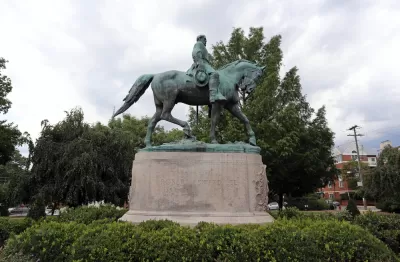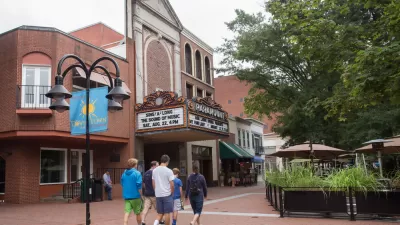In the aftermath of the violence in Charlottesville, resulting from the gathering of white supremacists and neo-Nazis, American cities are rethinking whether statues honoring the heroes of the Confederacy belong in public spaces.

During his infamous, impromptu press conference at Trump Tower last Tuesday, President Donald Trump asserted, "Not all of those people were white supremacists by any stretch," in response to a question about the alt-right protest on the campus of the University of Virginia on Friday night, Aug. 11. "Those people were also there because they wanted to protest the taking down of a statue, Robert E. Lee."
However, that statue, like others honoring heroes of the Confederacy, are symbols of white supremacy, writes Zack Beauchamp for Vox, who points to an April 2016 report by the Southern Poverty Law Center, "Whose Heritage? Public Symbols of the Confederacy," that shows two distinct time periods when most of the statues were dedicated.
The first began around 1900, amid the period in which states were enacting Jim Crow laws to disenfranchise the newly freed African Americans and re-segregate society. This spike lasted well into the 1920s, a period that saw a dramatic resurgence of the Ku Klux Klan, which had been born in the immediate aftermath of the Civil War.
The second spike began in the early 1950s and lasted through the 1960s, as the civil rights movement led to a backlash among segregationists. These two periods also coincided with the 50th and 100th anniversaries of the Civil War.
In a compelling op-ed for The New York Times, Karen L. Cox, a professor of history at the University of North Carolina at Charlotte, makes the same historical point, and also illuminates the title of the SPLC report.
But the Charlottesville march, with its hundreds of neo-Nazis and white nationalists coming out to defend the memory of General Lee, puts the lie to the notion that, as the apologists say, these monuments are about “heritage, not hate.”
This is hardly new. Confederate monuments have always been symbols of white supremacy.
Cox is also cited by PolitiFact about when "Confederate symbols gain prominence." It confirmed that they were "political statements aimed at African-Americans."
It's worth noting that Robert E. Lee himself "was against erecting Confederate memorials," writes Chris Boyette for CNN.
Related in Planetizen:
- BLOG POST, Dean Saitta: The Archaeology of Public Memory and Civic Identity, August 21, 2017
- Trafalgar Square Shows How to Reuse Pedestals Where Statues Once Stood, August 19, 2017
- Search the Location of the Nearest Confederate Monument, August 18, 2017
- Charlottesville and the 'War Against Public Space', August 15, 2017
- New Orleans Begins Removing Monuments to the Confederacy, April 24, 2017
FULL STORY: What Trump gets wrong about Confederate statues, in one chart

Planetizen Federal Action Tracker
A weekly monitor of how Trump’s orders and actions are impacting planners and planning in America.

Congressman Proposes Bill to Rename DC Metro “Trump Train”
The Make Autorail Great Again Act would withhold federal funding to the system until the Washington Metropolitan Area Transit Authority (WMATA), rebrands as the Washington Metropolitan Authority for Greater Access (WMAGA).

The Simple Legislative Tool Transforming Vacant Downtowns
In California, Michigan and Georgia, an easy win is bringing dollars — and delight — back to city centers.

The States Losing Rural Delivery Rooms at an Alarming Pace
In some states, as few as 9% of rural hospitals still deliver babies. As a result, rising pre-term births, no adequate pre-term care and harrowing close calls are a growing reality.

The Small South Asian Republic Going all in on EVs
Thanks to one simple policy change less than five years ago, 65% of new cars in this Himalayan country are now electric.

DC Backpedals on Bike Lane Protection, Swaps Barriers for Paint
Citing aesthetic concerns, the city is removing the concrete barriers and flexposts that once separated Arizona Avenue cyclists from motor vehicles.
Urban Design for Planners 1: Software Tools
This six-course series explores essential urban design concepts using open source software and equips planners with the tools they need to participate fully in the urban design process.
Planning for Universal Design
Learn the tools for implementing Universal Design in planning regulations.
Smith Gee Studio
City of Charlotte
City of Camden Redevelopment Agency
City of Astoria
Transportation Research & Education Center (TREC) at Portland State University
US High Speed Rail Association
City of Camden Redevelopment Agency
Municipality of Princeton (NJ)




























